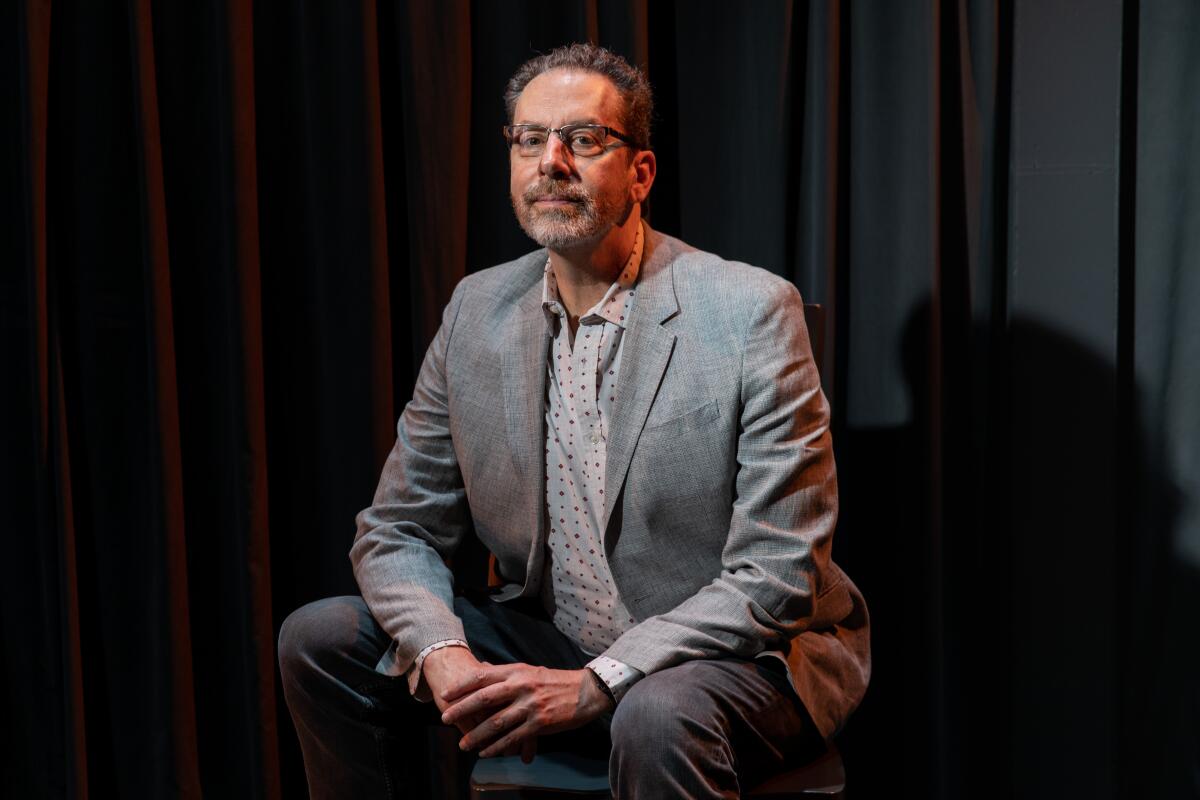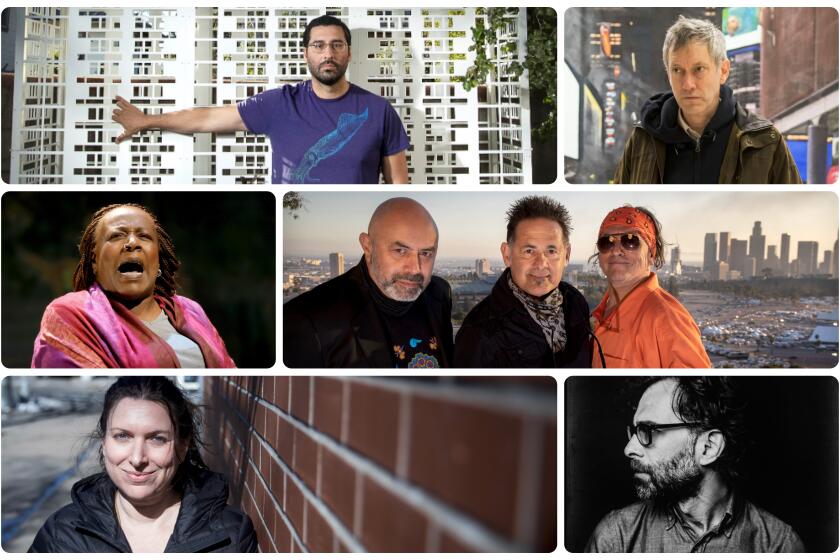His Sondheim show was a COVID-19 casualty, but Michael Michetti hasn’t lost his ‘Passion’

L.A. stage director Michael Michetti says: “As an artist, I am often excited when there are limits that force you to come up with more creative solutions.”
- Share via
This profile of stage director Michael Michetti wasn’t supposed to turn out this way. A year late — and without the show that occasioned the interview.
In January 2020, before COVID-19 upended civilization as we know it, I had lunch with Michetti at a West Hollywood restaurant. We talked about his upcoming revival of the Stephen Sondheim-James Lapine musical “Passion” at Boston Court Pasadena, where he had stepped down as co-artistic director after 16 valiant seasons.
A new era of independent work was beginning for Michetti, one the city’s sharpest and most accomplished stage directors. He was excited to be able to say yes to opportunities, here in Southern California and beyond, unencumbered by the daily responsibilities of running a theater.
Boston Court, wisely not wanting to let him out of the fold, had given him an emeritus title. This production of “Passion” was the theater’s first foray into Sondheim, a hugely ambitious undertaking for the intimate venue, made possible by a grant from the foundation of David Lee (another of L.A.’s finest directors) and the leadership of artistic director Jessica Kubzansky, Michetti’s longtime partner at Boston Court. It was the spring 2020 theater offering I was most eager to see.
Unfortunately, Michetti’s revival of “Passion” ended before it officially opened. After a week of four preview performances, the news about the coronavirus took a dark turn.
That Sunday, March 8, I had traveled down to La Jolla Playhouse to see “Fly,” a new musical based on the J.M. Barrie novel “Peter and Wendy.” I went alone, brought hand sanitizer and tried to keep my distance from the crowd. I was anxious to be in a theater. Only a few days earlier I had determined that it was no longer safe to work out at my gym. Driving home from La Jolla, I thought long and hard about the danger of doing my job.
The following Saturday, “Passion” was scheduled to open. “Fly” turned out to be the last time I was in a theater.
In a recent Zoom conversation, Michetti recalled that the team at Boston Court was trying to figure out what to do without much guidance. Theaters were calling one another for advice. At the premiere of “Fly,” I asked La Jolla Playhouse’s press representative whether there had been talk of canceling the opening. She told me that the theaters in San Diego had been in active conversation but that there had been no public health order yet for them to close.
Everyone was operating in the dark. On March 12, the day New York Gov. Andrew Cuomo ordered Broadway to shut down, Boston Court determined that the opening of “Passion” would have to be postponed. There was discussion of whether one last performance could be given for friends and family of the company, but the decision to operate even in this limited capacity seemed unwise.
Meanwhile, my feature on the production was ready to go. Times photographer Jay L. Clendenin had already shot Michetti inside Boston Court. The publication date was set for Sunday, March 15. Michetti had been made aware through fact-checking that I had written a laudatory story about him. But the article never ran — rubbing salt in the wounds.
At the time, no one knew how long the shutdown would last. Maybe in a couple of months the theaters would reopen, “Passion” would be announced, and we’d run the feature then. Like a Beckett play, we waited and waited for a message that never arrived.
I contacted Michetti in the summer to see if he had any virtual theater plans. I was looking for an opportunity to revisit our interview, but the article sank lower in my document folder.
When we spoke more recently on Zoom, he mentioned that the prospect of a digital version of “Passion” had been explored. “We wanted to be sure we could do it as well as possible in that format,” he said. “That would have been expensive and difficult to do, and it wasn’t clear whether streaming could be monetized to recoup those costs.”
The show went from being postponed to being canceled. But Michetti still has hope that a revival of “Passion” with his name on it will return.
What had me champing at the bit was the prospect of experiencing Sondheim in the intimacy of Boston Court. The Menier Chocolate Factory, a pocket stage powerhouse in London (where one unforgettable night I saw “A Little Night Music” in close-up), has given new life to old musicals by stripping them down to their human essence.
Michetti, who staged a concert version of “Passion” more than 20 years ago, was ideally suited for the job. I’ll admit that whenever his name appears in a program, I breathe a sigh of relief. On the few occasions an artistic director from elsewhere has asked me for a recommendation of local theater talent, I put Michetti on the top of my list.
The World Health Organization announced the coronavirus outbreak had become a pandemic on March 11, 2020. Since then, the virus has seemingly touched all aspects of life in Southern California and beyond. The Times looks back on a full year of life in a pandemic.
As his production history reveals, he is not a specialist. Michetti directs classics, musicals and new (and newish) plays. At Boston Court, he swept the cobwebs from Tennessee Williams’ “A Streetcar Named Desire” in a revival that featured a multicultural cast and a DJ brewing an acoustical gumbo. His chivalrous production of “Man of La Mancha” for Reprise Theatre Company had me booming “The Impossible Dream” for weeks. And at Pasadena Playhouse, he proved that there’s more to “King Charles III,” Mike Bartlett’s “future history play,” than British hype, in a production that was as humane as it was archly ironic.
When I asked Michetti last year if he had a signature style, he seemed almost embarrassed by the question. A natural modesty prevents him from prattling on about himself. If he seems buttoned-up or earnest at times, the fugitive grin that flashes across his face suggests he’d really rather spill tea, but someone has to hold down the fort.
About his directing aesthetic, he explained that he has been careful throughout his career to avoid being pigeonholed. But underscoring all his work, he acknowledged, is a desire to probe ever more deeply into story.
“I love digging into a text,” he said between bites of a hamburger. “I’m always trying to find ways to bring the text to life, to reveal things that previous productions might have missed. Or if it’s a new work, collaborating in such a way that allows me to understand what the playwright is after and how to help support the best version of that story.”
One could safely conclude that Michetti is a playwright’s director, except that he isn’t timid about taking liberties. The label auteur doesn’t quite fit, as he’s not looking to re-author a work through his staging. But he plays fast and loose with period and setting (he set his first Boston Court production, “Romeo & Juliet,” in the antebellum South) and isn’t afraid to challenge traditional expectations (his updated “Streetcar” was transposed to a sultry, interracial New Orleans). Never bold for boldness’ sake, his directorial gambles serve to expose what familiarity has concealed, reintroducing us to work we mistakenly thought we knew.
With the sheepishness of a father who doesn’t want to pick favorites among children, Michetti was hesitant to single out productions in which the magic all came together. With a little nudging, however, he did fondly recall his inaugural Boston Court production of “Romeo and Juliet” in which he cast a teenage (and at that point unknown) Tessa Thompson in her first role at the theater. He also mentioned Eric Whitacre’s “near opera” “Paradise Lost: Shadows and Wings,” Tom Jacobson’s “The Twentieth-Century Way” and (one of my favorites) “Stupid ... Bird,” Aaron Posner’s Chekhov mash-up with the unprintable title.
Michetti was part of the leadership team of Boston Court from its founding in 2003 until the end of 2019. His decision to step down was partly prompted by an anticipated change in California employment law, the AB 5 legislation that restricted the classification of workers operating as independent contractors, as he (even as co-artistic director) was categorized.
In response, Boston Court’s board of directors made the decision to restructure the artistic management. Feeling that it was the right time to test his wings and assured that the theater was in the best of hands with Kubzansky, Michetti decided to take a leap.
And then the world fell off its axis.
The financial strain has been tough. Fortunately, he paid off his mortgage on his house in West Adams in 2019, and since, as he said, there’s no place to go, he has not been spending much money.
What has hit him hardest is the physical separation from his artistic peers. A San Diego native and USC graduate, Michetti is deeply rooted in the local theater community. There’s nowhere he’d rather live or work. His professional and personal worlds have been built here, around this art form.
As the one-year anniversary of the COVID-19 pandemic arrives, we want to hear from Angelenos in the theater industry about what life has been like since.
To be a stage director in L.A. is next to impossible. To be a stage director without a Hollywood revenue stream who owns his own home is either a miracle or evidence of a rare talent. When we talked last year, he expressed pride in being part of this special theater tribe and reflected on the city’s unique cultural ecology.
“L.A. has by most measures the largest professional acting talent pool on planet Earth, but the vast majority of actors are here in the hopes of getting some good money doing film and television,” he said. “A lot of those people are wonderful talents who have a love for theater and want to do more, but there is certainly not enough Equity work for all those people to sustain themselves in just the theater here. So that’s part of the challenge, offset by the potential. But this is not a new story. Financially, the Los Angeles theater scene is always going to be in the shadow of the film and television industry. On the other hand, it means there’s this fantastic pool of artists who have committed to the city and who want to make work that is meaningful to them.”
This fragile system is now going through the severest of tests. But something Michetti said last year about the adaptability and resourcefulness of his fellow artists is even more reassuring after this unthinkable year.
“So much of Los Angeles theater, especially in the smaller houses, is driven by the passion of artists, and they will always find a way to make it work,” he said. “As an artist, I am often excited when there are limits that force you to come up with more creative solutions. The American theater aesthetic grew largely out of the regional theater movement, in which there was not the financial capability to create the lavish sets that they had on Broadway. Those limitations forced artists to think about how else we might approach productions, so design became more minimalist and metaphoric in a way that I think elevates theater. We are always having to turn limitations into strengths.”
“Passion” was a casualty of the pandemic, but Michetti’s ardor remains undiminished. After a period in which he purposely directed his attention away from what he could not control, he’s now been imagining future projects and even having theater collaborators pop up in his dreams. For this consummate Angeleno of theater, the light at the end of the tunnel leads directly to a rehearsal room.
Daniel Fish, Culture Clash, Dael Orlandersmith, Richard Maxwell, Annie Dorsen and Lars Jan reveal much loss — but also see a way forward.
More to Read
The biggest entertainment stories
Get our big stories about Hollywood, film, television, music, arts, culture and more right in your inbox as soon as they publish.
You may occasionally receive promotional content from the Los Angeles Times.














